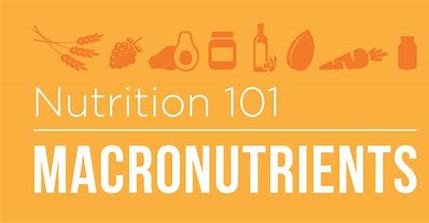Macronutrients are the nutrients that your body needs in large amounts to provide energy and support overall bodily functions. They are the building blocks of your diet and play essential roles in maintaining health, supporting metabolism, and fueling physical activity. There are three primary types of macronutrients: carbohydrates, proteins, and fats. Each macronutrient provides a unique set of functions and benefits to the body.

1. Carbohydrates
Carbohydrates are the body’s preferred source of energy. They are found in a wide variety of foods, including grains, fruits, vegetables, and dairy. Carbs are broken down into glucose (sugar) in the body, which is then used for energy.
Functions of Carbohydrates:
- Energy Production: Carbs are the body’s primary energy source. Glucose is used by the brain, muscles, and other tissues as a quick source of fuel.
- Storage of Energy: Any excess glucose is stored in the liver and muscles as glycogen for later use. Glycogen acts as a reserve energy supply for the body during times of need (like exercise).
- Supporting Brain Function: The brain relies heavily on glucose for fuel. It uses a significant portion of the body’s daily carbohydrate intake, making carbs essential for proper cognitive function.
Types of Carbohydrates:
- Simple Carbohydrates: Found in foods like sugar, fruit, and dairy, these carbs are broken down quickly in the body. They provide fast energy but can cause spikes in blood sugar levels.
- Complex Carbohydrates: Found in whole grains, legumes, and vegetables, these carbs take longer to digest and provide sustained energy over time. They are often higher in fiber, which aids in digestion and helps regulate blood sugar levels.
Recommended Intake:
- Carbohydrates should make up about 45-65% of your total daily calorie intake, depending on your activity level and personal needs.
2. Proteins
Proteins are crucial for building and repairing tissues in the body, including muscles, organs, skin, and hair. They are made up of amino acids, which are the building blocks of muscle and other vital structures.
Functions of Protein:
- Muscle Building and Repair: Protein plays a central role in repairing muscle tissue after exercise and building new muscle fibers. This is particularly important for individuals who engage in strength training or endurance sports.
- Enzyme and Hormone Production: Proteins are essential for the creation of enzymes, which catalyze biochemical reactions in the body, and hormones, which regulate various bodily functions (e.g., insulin for blood sugar regulation).
- Immune Function: Antibodies, which help protect against infections, are made from proteins. A strong immune system relies on an adequate protein intake.
- Transport and Storage: Some proteins act as carriers to transport molecules throughout the body (such as hemoglobin transporting oxygen in red blood cells).
Sources of Protein:
- Animal-Based Proteins: Meat, poultry, fish, eggs, and dairy products.
- Plant-Based Proteins: Legumes (like beans and lentils), tofu, tempeh, quinoa, and seeds/nuts.
Recommended Intake:
- Protein should make up about 10-35% of your total daily calorie intake. The average adult requires around 0.8 grams of protein per kilogram of body weight, but this can increase depending on physical activity levels and specific health goals (e.g., muscle building).
3. Fats
Fats often get a bad reputation, but they are vital to numerous bodily functions. Like carbs and protein, fats provide energy, but they also have specific roles that are critical for health.
Functions of Fats:
- Energy Storage: Fats provide a concentrated source of energy. When the body needs energy, stored fat can be broken down into fatty acids and used for fuel.
- Cell Membrane Structure: Fats, particularly phospholipids, are essential components of every cell membrane in the body. They provide structure and flexibility to cells.
- Absorption of Vitamins: Certain vitamins (A, D, E, and K) are fat-soluble, meaning they are best absorbed when consumed with fats.
- Hormone Production: Fats are involved in producing hormones, such as steroid hormones (e.g., estrogen, testosterone, and cortisol), which regulate many bodily functions.
- Brain Function: The brain is made up of about 60% fat, and essential fatty acids are important for cognitive functions, memory, and overall brain health.
Types of Fats:
- Unsaturated Fats: These are considered the healthiest fats and are found in foods like avocados, olive oil, nuts, seeds, and fatty fish. They help improve cholesterol levels and support heart health.
- Monounsaturated Fats: Found in olive oil, avocados, and nuts, these fats help reduce inflammation and improve cardiovascular health.
- Polyunsaturated Fats: Found in fatty fish, flaxseeds, walnuts, and sunflower oil, these fats contain omega-3 and omega-6 fatty acids, which are important for heart health and reducing inflammation.
- Saturated Fats: These fats are typically found in animal-based products (e.g., red meat, butter) and some plant-based oils (e.g., coconut and palm oil). While moderate intake may not pose a risk for everyone, excessive consumption can increase the risk of heart disease.
- Trans Fats: These are artificially created fats found in some processed foods (e.g., baked goods, margarine). Trans fats should be avoided, as they can raise bad cholesterol (LDL) levels and increase the risk of heart disease.
Recommended Intake:
- Fats should make up about 20-35% of your total daily calorie intake. Focus on consuming healthy fats, especially unsaturated fats, while limiting the intake of saturated fats and avoiding trans fats.
4. Balancing Macronutrients in Your Diet
Each of these macronutrients serves a unique and essential purpose in your diet, and balance is key. Depending on your health goals, activity level, and personal preferences, your macronutrient needs may vary.
- For general health and energy: Aim for a balanced intake of all three macronutrients: carbohydrates for energy, protein for muscle repair and immune support, and healthy fats for heart health and cellular function.
- For weight management: A moderate intake of carbohydrates, higher protein to maintain muscle mass, and a healthy fat intake can be beneficial in supporting metabolism and reducing hunger.
- For muscle building or athletic performance: Increased protein intake is crucial for muscle growth and recovery, while sufficient carbohydrates are needed for energy during intense exercise.
A balanced approach often includes:
- Complex carbohydrates from whole grains, fruits, and vegetables.
- Lean proteins like chicken, tofu, legumes, and fish.
- Healthy fats from nuts, seeds, olive oil, and fatty fish.
5. Micronutrients: The Unsung Heroes
While macronutrients provide the necessary energy and structure for the body, micronutrients (vitamins and minerals) are also essential, albeit in smaller amounts. They support many physiological processes, such as immune function, energy production, and bone health.
Conclusion
Understanding the role of macronutrients—carbohydrates, proteins, and fats—is key to creating a healthy, balanced diet that supports your body’s needs. Each macronutrient serves a unique function and works in harmony with the others to keep you energized, strong, and healthy. By focusing on whole, nutrient-dense foods, you can ensure that you’re meeting your body’s macronutrient needs while supporting overall health.
